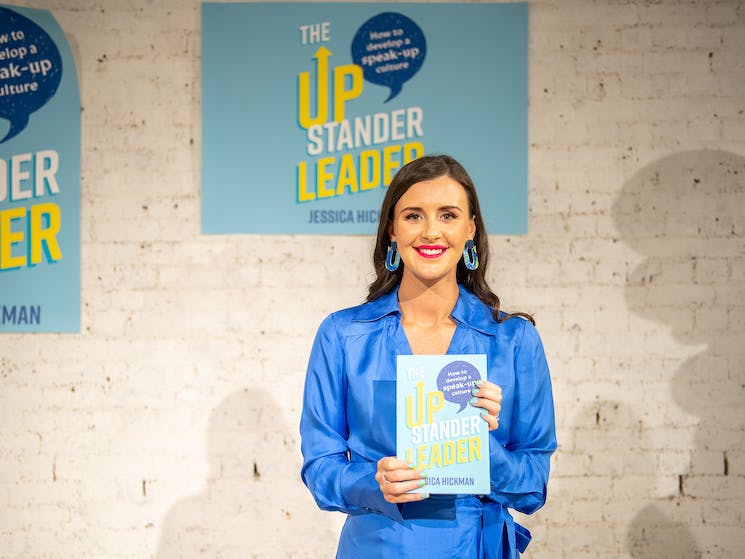Bralca has a passion for ‘leading the way for the next generation’ so we would like to share the importance of upstanding leaders in the workplace. Workplace culture plays a vital role in everyday operations, particularly within Agriculture where we form close relationships with both our own team (who can often be relatives) and the local communities in which we work.

Central West NSW local, Jessica Hickman is a TEDx speaker, founder of Bullyology, and an Author of two award winning books, including the upstanding leader. The upstander leader is an inspiring and informative guide for a new generation of leaders who are ready to speak up against toxic behaviour and bullying in the workplace. Jessica was a victim of workplace bullying over a three-year period when she saw first-hand the Bystander Effect. It motivated her to write The Upstander Leader to encourage leaders to develop a speak-up culture in their organisations.
While exploring the bystanders blindfold (https://jesshickman.com/the-bystanders-blindfold/) with Jessica Hickman, we can see a lot of trends that are common amongst the agricultural industry. Many are familiar with the three Monkeys— with one holding its paws over its mouth, the other covering its ears, and the last one covering its eyes.
While the Japanese often see these monkeys as imparting a message of “speak no evil, hear no evil, see no evil”, there is also the importance of the bystander effect. We often turn a blind eye to the evils that one sees and encounters.

When do we need to take action?
When bullying goes unacknowledged or when tension is prevalent within a team. It is important to ask yourself 'has the monkey possibly manifested itself in you'? When you let out an uncomfortable giggle in response to a sexist joke by a supervisor, or when you pretend you didn’t notice when a team member was gaslighted into believing it’s just a joke or been told to just “toughen up”?
Jessica states this monkey with its paws folded comfortably over its eyes, is the manifestation of what it means to be a bystander. And the first step to becoming an upstander, is to take off that self-imposed blindfold. The first step to becoming an upstander, is to have the courage to open your eyes, and acknowledge injustice for what it is.

What can you do?
As a workplace leader
You need to consistently ask yourself – what is happening within my team? Pay close attention to your own words, action, beliefs and the physical environment your team is operating within. With an attention to behaviour, we can pick up on small things such as a change in mood or tone of voice, and raising levels of tension and stress. By identifying these behaviours, we can work to fix an issue, without recognising and seeing these behaviours we risk falling into the bystander effect. Stay self aware and aware of your team and their surroundings.
As a team member
Ensure you are self-aware and stay regulating your emotions frequently. You need to be able to understand how workplace situations are impacting on you physically, mentally and emotionally. If you recognise behaviour that causing angst within yourself, speak up. Develop an understanding of where you need to be reporting this behaviour to, wether it is to authorities, a supervisor, a team leader or head office etc.
Apprentices/ trainees
Apprenticeships and traineeships are a common path within agriculture. Apprenticeships are structured training programs where individuals learn and develop skills in a specific trade or profession. The focus should be on education, mentorship, and skill development, not on subjecting apprentices to harmful or degrading activities. If you or someone you know is experiencing hazing or any form of harassment at work, it’s essential to report it to the appropriate authorities within your workplace or regulatory agencies to ensure a safe and supportive environment for all employees (https://jesshickman.com/of-rituals-of-ragging-and-of-responding/)
Be an Upstander
It’s crucial for employers and organisation to create a culture of respect and zero tolerance for bullying or mistreatment in the workplace. If you are experiencing or witnessing bullying, it’s essential to report it to your employer or HR department so that appropriate actions can be taken to address the issue. Being an Upstander is about shifting from being the passive bystander to becoming the proactive change maker. Being an Upstander is about calling out injustice and abuse, it is about becoming a purpose-driven initiator of a positive culture. To respond to the ragging and the bullying and the hazing by standing up against it, whether you are personally impacted or not, is to be an Upstander (https://jesshickman.com/)
As a progressive industry, with a new generation entering agriculture, we are all responsible to recognise and respond to these negative behaviours and take action. Through speaking up we can create a positive and inclusive future to reach desired outcomes.
Author: Brooke Watts & Jessica Hickman
Bralca.com: increasing choice through knowledge


